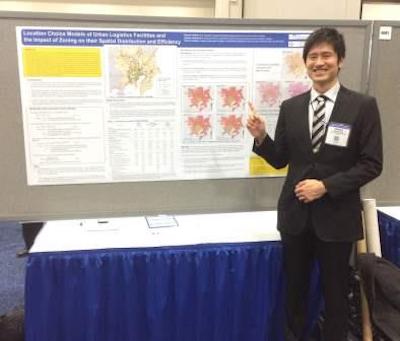Alumni Feature Profile: Takanori Sakai

Alumni Feature Profile: Takanori Sakai, PhD, Urban Freight Modelling in Singapore
In May of 2017, the UTC faculty and staff bid farewell to Takanori Sakai, a long-standing UTC research assistant who earned his PhD in Urban Planning and Policy through the UIC College of Urban Planning and Public Affairs.
Shortly after graduation ceremonies, Taka and his family departed for Singapore, where he began work as a Research Associate at the Singapore-MIT Alliance for Research and Technology (SMART) Centre, a research center operated by the Massachusetts Institute of Technology.
Taka joined a research group, Future Urban Mobility,” and is working on an Urban Freight Survey and Modelling plan for Singapore. The work contributes to the development of freight transport component of SimMobility, a next-generation urban simulation platform.
Throughout his career, Taka served as a visiting scholar in Tokyo and Paris, and he was presented with the Best Paper recognition by the TRB Urban Freight Transportation Committee for “Logistics Chain Modeling for Urban Freight: Pairing Truck Trip Ends With Logistics Facilities.” The presentation was made during the 2017 Transportation Research Board Annual Meeting.
In April 2017, Taka successfully defended his thesis: “The Simulations of the Urban Logistics Land Use and Associated Logistics Chains for Policy Insights.” Below is an abstract of the thesis.
Thesis Abstract
The globalization of supply chain networks and the advances in the Information and Communication Technologies have significantly changed logistics practices over the last several decades. Modern logistics operations that prioritize the cycle time reduction require larger logistics facilities than ever before. These changes in the logistics sector, when combined with the growth and further densification of cities, have led to the spatial restructuring of logistics-related land use that often entails the outward migration of logistics facilities. While researchers and practitioners have voiced concerns over the potential increase in negative externalities associated such restructuring, such as congestion, emissions, noises, vibrations and traffic accidents, the actual levels of impacts and the policies that can alleviate them have not been sufficiently studied in the past.
To address this gap, this research carries out four broad tasks: (1) the empirical analysis of the spatial reorganization of the urban systems and its impacts, (2) the development of a simulation model for analyzing logistics facility distribution and associated urban freight traffic, (3) the evaluation of various scenarios of logistics facility distribution and, (4) the analysis of different policy options and the evaluation of the impacts. The data from the Tokyo Metropolitan Area, the largest metropolitan area in the world, are used for all the tasks. The results of the analyses shed the light on the relationships among policies, the spatial distribution of logistics facilities, urban logistics chains, and the externalities. The policy insights for reducing the externalities associated with urban freight are also obtained.
PhD, Research Associate, Singapore-MIT Alliance for Research and Technology (SMART) Centre Heading link

In May of 2017, the UTC faculty and staff bid farewell to Takanori Sakai, a long-standing UTC research assistant who earned his PhD in Urban Planning and Policy. Shortly after graduation ceremonies, Taka and his family departed for Singapore, where he took a research position and will continue his scholarship into urban freight modelling and logistics management.